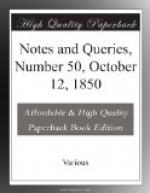“His wealth is summed, and this
is all his store:
This poor men get, and great men get no
more.”
Was Young dull? Listen, for it is indeed a “solemn sound:”—
“The bell strikes one. We take
no note of time
Save by its loss, to give it then a tongue
Was wise in man.”
Was Milton tame? Hear the “lost archangel” calling upon Hell to receive its new possessor:—
“One
who brings
A mind not to be chang’d by place
or time.
The mind is its own place, and in itself
Can make a heav’n of hell,—a
hell of heav’n.
What matter where, if I be still
the same,
And what I should be; all but less than
he
Whom thunder hath made greater?
Here at least
We shall be free; the Almighty
hath not built
Here for his envy; will not drive
us hence:
Here we may reign secure; and in
my choice
To reign is worth ambition, though
in hell:
Better to reign in hell, than serve
in heav’n!”
A great conjunction of little words! Are monosyllables passionless? Listen to the widowed Constance:—
“Thou mayst, thou shalt! I
will not go with thee!
I will instruct my sorrows
to be proud;
For grief is proud, and makes his owner
stout;
To me, and to the state of my great grief,
Let kings assemble; for my grief’s
so great,
That no supporter but the huge
firm earth
Can hold it up: here I and sorrow
sit;
Here is my throne: bid kings come
bow to it.”
Six polysyllables only in eight lines!
The ingenuity of Pope’s line is great, but the criticism false. We applaud it only because we have never taken the trouble to think about the matter, and take it for granted that all monosyllabic lines must “creep” like that which he puts forward as a specimen. The very frequency of monosyllables in the compositions of our language is one grand cause of that frequency passing uncommented upon by the general reader. The investigation prompted by the criticism will serve only to show its unsoundness.
K.I.P.B.T.
* * * * *
ON GRAY’S ELEGY.
If required to name the most popular English poem of the last century, I should perhaps fix on the Elegy of Gray. According to Mason, it “ran through eleven editions in a very short space of time.” If he means separate editions, I can point out six other impressions in the life-time of the poet, besides those in miscellaneous collections viz. In Six Poems by Mr. T. Gray, London, 1753. Folio—1765. Folio—and in Poems by Mr. Gray, London, 1768. small 8o.—Glasgow 1768. 4o.—London. A new edition, 1768. small 8o. A new edition, 1770. small 8o. So much has been said of translations and imitations, that I shall confine myself to the text.




